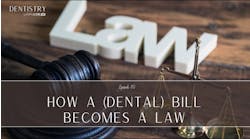In 1996, Derrick Hamilton was convicted of a murder he did not commit. During his two-decade stay in a heavily gated and barred hotel, Hamilton became a jailhouse lawyer, and he helped many of his fellow inmates appeal their convictions. On his own account and during his 23rd year of prison confinement, he was successful in convincing prosecutors that he was wrongfully convicted.
Recently, Hamilton took on a new role in his calling to fight injustice: a successful plaintiff. The legal experience he learned in lockup molded him into one of the greatest advocates for those charged with crimes they did not commit. Hamilton was awarded a $7 million settlement for imprisonment that was based upon false and fabricated evidence from a legal system designed to protect its citizens.1
Like the legal system, the dental insurance system was designed to protect the public by increasing the number of people seeking dental care and encouraging insured citizens to be proactive about their dental needs. By increasing this type of “dental care awareness” in the public, the idea was to drive new patients to dental offices and thereby assist dentists in filling their chairs with a constant flow of new patients, as well as a reasonable rate of utilization (dental benefit usage) among existing patients. In fact, in 1963, nearly 7,000 dentists joined one of the first dental plans known in the United States, the California Dental Services Network, now known as Delta Dental of California.2
Back then, the objectives of dentists were aligned with that of the originators of dental insurance, namely California Dental Services, Washington Dental Services, and Oregon Dental Services. That mission was to create a system through dental benefit programs to encourage and increase public awareness toward good oral health.2 Needless to say, the original partnership between dentists and insurers has all but disappeared.
The problem
The original design of dental insurance met its objective in popularizing its product—nearly 77% of the public have a dental benefit plan.2 Today, dental insurance has rapidly shifted its focus from a partnership with dentists in servicing the oral health of the pubic, to a profit-driven opportunistic model where doctor opinions do not appear to matter.3 Many of you reading this are likely frustrated with the constant claims denials on covered services that are deemed medically necessary. How many of you end up writing off buildups (necessary for crown retention) due to “bundling” policies within insurance plans? Or does the insurance company claim that the buildup was not necessary? How many times have you fought denied periodontal claims due to lack of “bone loss,” lack of “attachment loss,” or lack of anything else that is clearly noted in your narratives or seen in photos that you submitted as part of your claim?
It’s evident that the trend among all dental insurance plans is that they’re more than happy to collect premiums from employers and individuals. But when it comes to paying claims for insurance benefits that patients are entitled to, doctors are put through adjudication roulette, where every chamber in the revolver is loaded. Most feel defeated, with little or no recourse when insurance commissioners side with lobbying efforts on the part of the insurance industry.4 Needless to say, insurance participation on the part of dentists often feels like a prison sentence, where many of you are a version of Derrick Hamilton, seeking justice for decades of injustices from the insurance industry.
The solution
As we saw with Hamilton’s story, wrongful convictions and injustices can be reversed. In dentists’ case, I liken wrongful convictions to the sense of ownership and control the insurance industry claims to have over you. After all, in-network participation is an agreement where you submit to their rules, not your own. As I observe how doctors are responding to restrictive in-network agreements, the solution is firing PPO contracts and transitioning to an “unrestricted-status.” Yes, that means out-of-network.
But what it truly means is that you are better able to practice the quality of care you want to deliver to your patients. Unrestricted status frees you from the games and unreasonable policies that are forced upon you by virtue of in-network agreements. Transitioning to an unrestricted status requires will, desire, and a shift in how you communicate with patients—from a focus on insurance benefits to a focus on clinical quality and value. We are learning that many dental offices that have shifted to unrestricted status during the last 12 months of the pandemic have been successful in firing PPOs and retaining the majority of their patients when they apply a few key practices. Here’s what they’re doing.
Prepare your team
I’ve witnessed front office team members refer their most loyal patients to other dental offices during an out-of-network transition. They don’t have to do this, especially if they’re dealing with patients who have a PPO plan with out-of-network benefits. It’s important to persuade your team to believe that an unrestricted (out-of-network) status will allow you to protect your quality care by being in full control of all aspects of patient care, including how much you are paid. After all, if in-network agreements impose fee cuts, many dental offices respond by looking to cut the largest expense in their practices: payroll. Becoming unrestricted could very well equate to job security for many team members.
Prepare your patients
Here’s an effective script to notify patients that their dentist is transitioning to an unrestricted/out-of-network status:
“Hi Emily, thank you for visiting us today. I want to give you a heads up that we are transitioning to an unrestricted status with your insurance plan. Yes, this means out-of-network, but what it truly means is that we are eliminating insurance bureaucrats from unnecessarily interfering with the type of treatment you receive or what benefits they think you need. Insurance interference puts our patients at risk of not getting the quality of treatment they deserve, and quality of care is nonnegotiable. We are making this move for you and the good news is, you don’t have to switch dental offices. We will continue to take great care of you and look forward to seeing you again in six months for your next cleaning.”
With a script like this, and with good training and coaching, we’ve observed that a majority of patients will stay, and the hard-to-deal-with patients will leave and pester another office. According to Gallup polling, dentists are the fifth most trusted profession.5 Patients trust you and as a result, you have more say and control in whether patients stay (post out-of-network transition). For dental offices that have strong relationships with their patients, patient attrition after going out-of-network is usually between 10% and 15%. But we’ve seen dental offices lose as much as 30% of their patients (on a certain PPO plan) and still make 5% more in overall revenue (annualized) from the remaining 70% of patients compared to 100% of the patients they were seeing under the 45%–55% in-network discounted fee schedule.
When it comes to dropping an insurance contract, the numbers indicate that you have a lot of room for patient attrition before you lose money. I estimate that if you lose 47%–49% of your insured patients, at that point you are at a break-even, where you are generating the same revenue from those patients as you were generating when you saw 100% of those patients under in-network discounted fees.
Conclusion
I use Hamilton’s story of false imprisonment not to compare your in-network relationships to a prison sentence. Instead, his story gives us hope that even while a person or institution may treat you unfairly, your actions may determine how you’re repaid or made whole from those injustices you experience. When it comes to your relationship with insurance plans, your actions alone will determine the level of compensation and freedom you are entitled to.
It is very clear that with in-network participation agreements, while seemingly written as an exchange in value between you and the insurer, you are still subscribing to the insurance carrier’s rules and agree to abide by their policies. Within these agreements, there is often little to no flexibility as the insurance industry has adopted an “our way or the highway” response to doctors who protest. I’m here to tell you that there is a better way of life, a better way of practice, and a less stressful way to manage your business. It is that of an insurance-independent practice built with patients who come to you because they believe in you and not in their insurance plan. Such a path is available to all as thousands of dental offices are already enjoying the bliss of this practice model. Talk to some of them and learn from them. Insurance-independence is on the rise in this industry, and it’s here to stay!
References
- Feuer A. Falsely imprisoned for 23 years: Now he’s received $7 million. New York Times. November 19, 2019. https://www.nytimes.com/2019/11/19/nyregion/derrick-hamilton-louis-scarcella-exoneration.html
- History of oral health dental insurance. Delta Dental. https://www.deltadental.com/grinmag/us/en/ddins/2018/winter/history-of-dental-insurance.html
- Neal CE. You and your dentist may have a bone to pick with Delta Dental. Seattle Times. November 5, 2017. https://www.seattletimes.com/opinion/you-and-your-dentist-may-have-a-bone-to-pick-with-delta-dental/
- Mishak MJ. Drinks, dinners, junkets and jobs: How the insurance industry courts state commissioners. Public Integrity. Published October 2, 2016. Updated October 3, 2016. https://publicintegrity.org/politics/state-politics/drinks-dinners-junkets-and-jobs-how-the-insurance-industry-courts-state-commissioners/
- Dentists rank highly for honesty, ethics in Gallup Poll. ADA. December 11, 2012. https://www.ada.org/en/press-room/news-releases/2012-archive/december/dentists-rank-highly-for-honesty-ethics-in-gallup-poll
BENJAMIN TUINEI is the president of Veritas Dental Resources, a company that helps dentists improve insurance reimbursements. He has been recognized by several state dental associations and continuing education institutions as “the authority” on PPO strategies and fee negotiating. He has worked with 6,000-plus dentists and influenced more than $3 billion in negotiated revenue for his clients. To learn more, visit veritasdentalresources.com.







